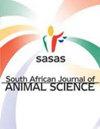从冲洗疏水管道回收的熟油脂作为饲粮脂肪源的比较能值
IF 0.6
4区 农林科学
Q3 AGRICULTURE, DAIRY & ANIMAL SCIENCE
引用次数: 0
摘要
本试验的目的是比较饲粮中添加从冲洗疏水管道中回收的烹饪油脂(冲洗疏水油脂;RTG)与传统补充脂肪(牛脂;TL、黄色油脂;YG)对饲用羔羊84 d生长性能、日粮能量和胴体性状的影响。选取48只Pelibuey × Katahdin羔羊(27.7±3.4 kg),采用完全随机区组设计进行试验:1)不添加脂肪的基础饲粮(对照组);2) 4% tl;3) 4% YG, 4) 4% RTG。补充脂肪代替对照饮食中的玉米。与传统脂肪(TL和YG)相比,冲洗捕集器油脂含有更高的水分(16.5% vs 0.92%)和杂质(3.6 vs 0.56%),总脂肪酸(64.90 vs 89.60%)更少。对照组和RTG添加组羔羊的日增重和增重效率相似,而常规脂肪组羔羊的日增重和增重效率高于对照组和RTG添加组羔羊。与RTG相比,添加常规脂肪的羔羊饲粮净能(NE)和观察值与预期值之比均高出4%。补充脂肪增加了脂肪沉积,但不影响任何其他胴体测量或非脂肪内脏质量。RTG的NE值估计为测试常规脂肪平均NE值(6.11 Mcal/kg)的57%。饲粮中添加RTG不影响羔羊的可接受性,是饲粮羔羊适宜的能量源。然而,由于其总脂肪酸含量较低,其能量值远低于传统的补充脂肪。本文章由计算机程序翻译,如有差异,请以英文原文为准。
Comparative energy value of cooked grease recovered from rinse-trap water lines used as dietary fat source for feedlot lambs
The objective of this experiment was to compare the effects of dietary supplementation with cooking grease recovered from rinse-trap water lines (rinse-trap grease; RTG) versus conventional supplemental fats (tallow; TL, and yellow grease; YG) on 84-d growth performance, dietary energy, and carcass traits of feedlot lambs. Forty-eight Pelibuey × Katahdin lambs (27.7 ± 3.4 kg) were assigned in a randomized complete block design to evaluate: 1) basal diet without supplemental fat (Control); 2) 4% TL; 3) 4% YG, and 4) 4% RTG. Supplemental fats replaced maize in the control diet. Rinse-trap grease contained greater moisture (16.5 vs 0.92%) and impurities (3.6 vs 0.56%), and less total fatty acid (64.90 vs 89.60%) than that of conventional fats (TL and YG). Daily weight gain and gain efficiency were similar for control and RTG supplemental lambs, whereas ADG and gain efficiency were greater for lambs fed conventional fats than control or RTG-supplemented lambs. Both dietary net energy (NE) as well as ratio of observed-to-expected dietary NE were 4% greater for lambs supplemented with conventional fats vs RTG. Supplemental fat increased fat deposition but did not affect any other carcass measures or non-fat visceral mass. Estimated NE value for RTG was 57% of the average NE value (6.11 Mcal/kg) of tested conventional fats. Supplementation with RTG does not affect diet acceptability, and accordingly, is a suitable energy source for feedlot lambs. However, due to its lower total fatty acid content, its energy value is much lower than conventional supplemental fats.
求助全文
通过发布文献求助,成功后即可免费获取论文全文。
去求助
来源期刊

South African Journal of Animal Science
农林科学-奶制品与动物科学
CiteScore
1.50
自引率
0.00%
发文量
39
审稿时长
>36 weeks
期刊介绍:
The South African Journal of Animal Science is an open access, peer-reviewed journal for
publication of original scientific articles and reviews in the field of animal science. The journal
publishes reports of research dealing with production of farmed animal species (cattle, sheep,
goats, pigs, horses, poultry and ostriches), as well as pertinent aspects of research on aquatic
and wildlife species. Disciplines covered nutrition, genetics, physiology, and production
systems. Systematic research on animal products, behaviour, and welfare are also invited.
Rigorous testing of well-specified hypotheses is expected.
 求助内容:
求助内容: 应助结果提醒方式:
应助结果提醒方式:


